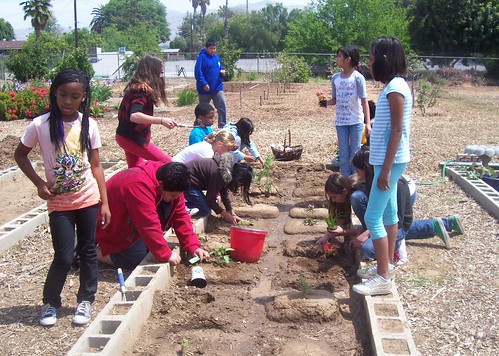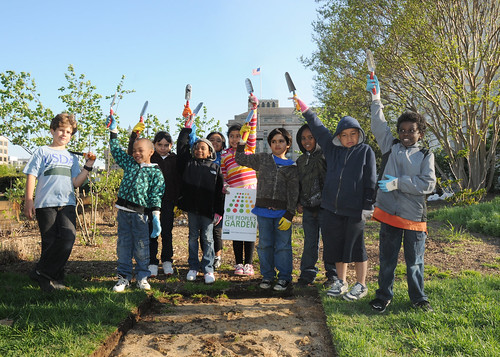
Cross posted from the Let's Move! blog:
Spring is here and that means it is time to get your hands in the soil and start gardening! As part of Let’s Move! Faith and Communities, First Lady Michelle Obama has challenged congregations and neighborhood organizations to plant gardens in their communities.
There are many positive benefits to starting a community garden: increasing access to healthy, fresh food; improving soil and water quality; providing exercise for people within a wide range of physical ability; and creating the opportunity to teach about nutrition, agriculture, and ecology. In short, starting a garden can help make real and lasting change in communities.
Whether you are new to gardening or have had many seasons in the soil, the U.S. Department of Agriculture (USDA) has a wide variety of resources available to help you start a community garden at your organization or congregation. Read on to learn more!

To learn more about the “how-to” for starting a new garden, the University of California Cooperative Extension’s Community Garden Start-Up Guide provides guidance on how to organize a sustainable garden site in your neighborhood.
The People’s Garden: Secretary of Agriculture Tom Vilsack challenged USDA employees to establish People’s Gardens at USDA facilities worldwide or help communities create gardens. People’s Gardens vary in size and type, but all have a common purpose – to help the local community they’re within and the environment. Visit the People’s Garden website to find the garden closest to you and more resources about gardening. Be sure to register your community garden on their new garden map!
Master Gardeners: are strong resources for gardening advice. Trained by USDA’s Cooperative Extension System, Master Gardeners are community members who volunteer their time to help Americans plant, grow, and harvest fresh produce from gardens. Master Gardeners are available in all 50 states and the District of Columbia. Every state and territory also has a Cooperative Extension state office at its land-grant university, as well as a network of local or regional offices. These offices are staffed by experts who can provide useful, practical information on gardening and nutrition.
National Agricultural Library: Before you start gardening, remember to test your soil for safety! USDA’s National Agricultural Library provides listings of labs nationwide. You can also call your local Cooperative Extension office or State Department of Agriculture to find out where to get soil tested.
Junior Master Gardener: This program provides an educational curriculum to help kids learn how to garden. You can organize youth in your community to register as a Junior Master Gardener group. Junior Master Gardener is a 4-H youth development program of the USDA Cooperative Extension system.
For a longer list of gardening resources, please visit the Let’s Move! community gardening page.
Get in touch! If you are a community or faith-based organization that has a garden or is starting one, please email collaborate@usda.gov to become a Let’s Move! Faith and Communities partner.




